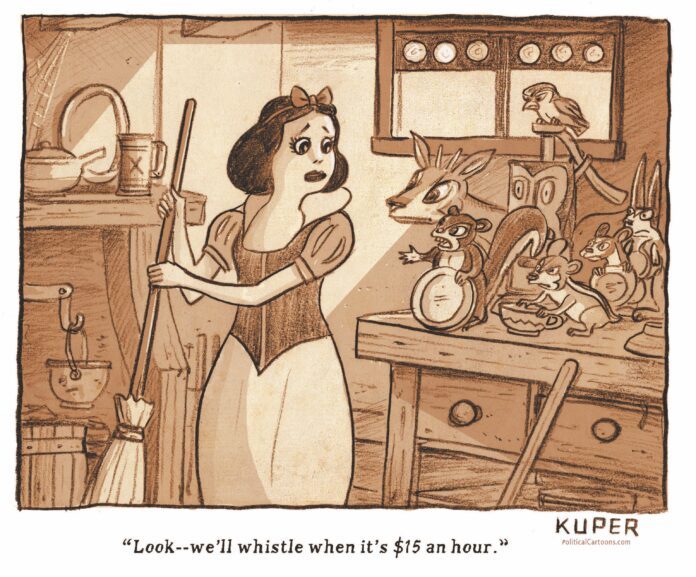One of the wonders of an otherwise bloated Oklahoma Constitution is the power The Founders secured for workaday Sooners to act when their elected elites won’t.
That was a far different time, of course. At statehood, early 20th century Oklahoma was a hotbed of progressivism. Radicalism, really. The little guy was championed, the suit-wearer suspect.
As Woody Guthrie put it, “Some will rob you with a six-gun, and some with a fountain pen.”
Today’s Oklahoma would seem opposite politically. A bastion of Culture War-fueled MAGA-ism. Less overt antipathy toward those with the means and cunning to rig the system.
And yet, the state’s progressive roots still run deep, evidenced when boxloads of petitions were delivered last week to the Secretary of State’s office, demanding a statewide vote aimed at raising the minimum wage.
#Imagine that.
If politics were game always played on the up-and-up, the question would appear on the Nov. 5 general election ballot. After all, presidential elections always draw the largest turnouts. What better time to ask if Oklahomans think $7.25 an hour is still acceptable – 15 years after it became the least someone could be paid?
Wouldn’t it be right and just to create a scenario in which the most Sooners weigh in?
How silly of me. The fact is, if SQ 832 must be on the ballot, the state’s Powers That Be want it decided by as few voters as possible. Why? Because the higher than turnout, the trickier it can be to control the outcome.
That’s why the Legislature, doing the bidding of political heavyweights like the State Chamber and Farm Bureau, hustled this session to make it even tougher for initiative petitions to get to the ballot – increasing standards for signatures to be considered valid and giving opponents more time to challenge them, from 10 days to 90.
As of today, only 103 days remain before election day. If opponents, as expected, pull every legal trick possible, it seems less-than-likely there’s enough time to get the issues resolved before ballots are printed weeks in advance of Nov. 5.
That’s where the words right and just come in. You see, the Legislature didn’t pass HB 1105 – changing the initiative petition rules – until late May … after Raise The Wage Oklahoma already began collecting signatures under the previous standards.
Moreover, Gov. Kevin Stitt didn’t sign it into law until May 31, roughly halfway through the 90-day signature-gathering period.
So, the question is: will opponents be given 90 days or 10 to challenge the validity of the signatures? It’s true that both the House and Senate passed the law as an “emergency,” meaning it took effect immediately upon the governor’s signature. But it’s neither right nor just morally to allow state policymakers to change the rules in the middle of the game.
By the way, Stitt will decide when the state question appears on the ballot. Raise The Wage Oklahoma’s Amber England told reporters last week that proponents will be “ready no matter what ballot they put us on.”
When shouldn’t even be an issue. Raise The Wage Oklahoma has done everything by the book to qualify for the ballot. If it is determined they collected the necessary 92,263 valid signatures, SQ 832 should be on the Nov. 5 ballot.
An estimated 320,000 Oklahomans would benefit from a minimum wage increase to $15 an hour over the next five years. It’s time to let the people decide. Sooner rather than later.







